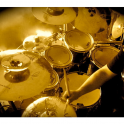Ricardo Antonio Acosta Palacios
Ricardo Antonio Acosta Palacios was born June 13th 1972 in Maturín Venezuela.
In 1989 he discovered his passion for the drums when his friend Martín Tosta invited him to see his rock band rehearsal. Immediately after that he decided to take drums classes with his friend Martín. After three months, he purchased his first drums which allowed him to practice and immerse himself into the instrument. At this point his life ambitions were shifting to a different direction he never thought before. His desire was to become a professional musician and have his own band. His passion for the drums and the music were growing with each day. His new circle of musician friends and exposure to see other band kept him highly motivated.
He started to look for better instructors; through his friends he met the drummer of Zapato 3 a very popular Venezuelan rock band in the 90’s, Diego Márquez. He taught him new techniques and recommended him to listen to other bands and musicians such as: The Police, Yes, Genesis and Sting as well as David Weckl and Vinnie Colaiuta both famous drummers.
Dave Weckl and Vinnie Colaiuta had a very important influence on Ricardo as they were his first contact with jazz and the fusion. The high level of execution amazed him in such a way that it motivated him to look for someone who could teach him this “new” style. Although he knew that jazz was not a very commercial form of music his love for it made him to pursue his aspirations. His friends recommended him to talk with Andrés Briceño.
Andrés Briceño is a famous session drummer, excellent jazzman and pioneer of the adaptation of afro-Venezuelan drums’ to the drums He plays at Juan Sebastián Bar, a jazz club in Caracas where the best musicians, not only Venezuelan, from other countries meet to play jazz. Ricardo began to frequent this bar and managed to arrange his first class with Andrés Briceño. After a few months of class Ricardo and Briceño built a friendship. He invited him to work with him on the stage for his concerts. This let Ricardo experience a diversity of musical styles all possessing an impeccable level of conception and interpretation. This motivated him to pursue into other styles of funk and jazz, including Venezuelan and afro-Venezuelan music, Latin music and Brazilian music. Unfortunately, Ricardo had to find a new instructor because Andrés Briceño had a very busy schedule and Ricardo wanted to continue to learn. His friend recommended him to Luis Tomás Ponce.
Luis Tomás García Ponce graduated from drummer Collective. The Maestro’s teachings helped Ricardo to improve his snare drum technique and utilize different drum skills using his hands and feet. Ricardo also learned how to read and study music in relation to the drums in different musical styles. Ricardo’s knowledge was greatly improved after the lessons with Luis Tomás García Ponce.
Ricardo also studied with Cristóbal Pital?a who helped him to master the style of jazz. He gave him tips and techniques for styles such as: funk and Venezuelan music. He also advised him to listen to many other jazz musicians. He had a great influence on Ricardo’s jazz career.
Part of Ricardo’s apprenticeship was to listen to other jazz bands, through this he discovered a Cuban band called Irakere who specialized in Latin Music using the instrument called the Clave Cubana. Ricardo had a strong interest in learning more about the roots of this style but he struggled to find information about it. Later on he found a video of José Luis Quintana, also known as “Changuito”, who was a Latin Music artist and player of the Clave Cubana.
Ricardo wanted to master the Latin music style. When he began to study he learned that all percussion instruments were created in Cuba. He also learned the drums with the timbal, the tumbadora and the bongos were the most important instruments in this style as they interact in a very organized way. He decided to focus his studies on the timbal for being the closest in technique to the drums.
After a long search for a timbal instructor Ricardo met Patricio “el Chino “Díaz, a Cuban timbal player who specialized in a technique called “Paileteria” which is a mix between the drums and the timbal. Díaz is one of the best percussionists in the world who also studied with Jose Luis Quintana (Changuito) from the orchestra Los Van Van and with Calixto Oviedo from the Ng La Banda. With Díaz, Ricardo understood the high conceptual level of the Clave Cubana as an instrument and how important it is to understand it in order to be able to execute the drums and the timbal. Ricardo loved Patricio Díaz’s impeccable technique. Díaz has provided great influence and inspiration on Ricardo.
Some other of Ricardo’s important influence were: Andrés Briceño, Patricio Díaz, Dave Weckl, Vinnie Colaiuta and Dennis Chamber.
Ricardo has played with important Venezuelan Jazz, Pop and Rocks bands. He has participated in a large number of Nacional musical productions and recordings.
Today, Ricardo teaches the drums in Maturin and plays in a band for the Ministry of God House Heaven Doors.



















